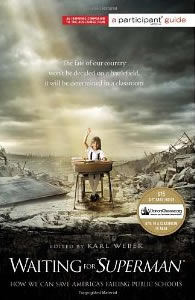Book Notes
 Karl Weber, editor, Waiting for Superman; How We Can Save America's Failing Public Schools (New York: Public Affairs, 2010), 279pp.
Karl Weber, editor, Waiting for Superman; How We Can Save America's Failing Public Schools (New York: Public Affairs, 2010), 279pp.
The depth of dysfunction in our public schools is now well known through any number of familiar sound bytes. The United States ranks at the bottom of thirty developed countries in math and science. Only about half of our African-American and Latino students, and about seventy-six percent of whites, graduate from high school. Educational experts disagree about fundamental issues, and spending on education has more than doubled in the last forty years. These statistics have drastic economic ramifications for our country, but even more important is the ethical issue of a basic civil right — a child's hope for a decent education shouldn't rest in the luck of a lottery ball.
This book was published in conjunction with Davis Guggenheim's film of the same title. I expected it to be little more than a promotional piece, and it is that, but much of the book is well worth reading. Ten different authors involved in education each contribute a chapter. There are numerous bright spots and innovative reforms underway, like Geoffrey Canada's Harlem Children's Zone and the KIPP network of charter schools. Mark Zuckerberg of Facebook has pledged $100 million to the Newark schools. But these efforts are hardly scalable in a way that could serve our 56 million K-12 students in 100,000 schools. There are about 5,000 charter schools, but a 2009 study at Stanford University found that only 17% of them outperformed comparable public schools. Michelle Rhee was a maverick reformer as chancellor of the Washington, DC, public schools, but resigned after three years in October 2010.
Everyone gets their say in this book, including Randi Weingarten, president of the American Federation of Teachers, which teacher's unions were vilified in Guggenheim's movie. But Weingarten wonders, when kids fail, why are teachers the targets? What about staff, administrators, politicians who slash budgets, policy makers, local school boards, and parents? After all, a child only spends about a quarter of a day in school. Eric Hanushek of Stanford argues that "family is not destiny," but Weingarten points out that "family socioeconomic status is still the number-one predictor of student achievement" (155). Perhaps in this case correlation is linked with causation, which becomes very scary when you consider that "almost half of our 56 million public school children live in or near poverty or in homes where English is their second language" (112). It's no wonder that in his chapter Bill Gates says that reform of our public schools is the toughest challenge his foundation has ever tackled. For an analysis of Geoffrey Canada's work in Harlem and its own problems see http://www.nytimes.com/2010/10/13/education/13harlem.html?hp.


